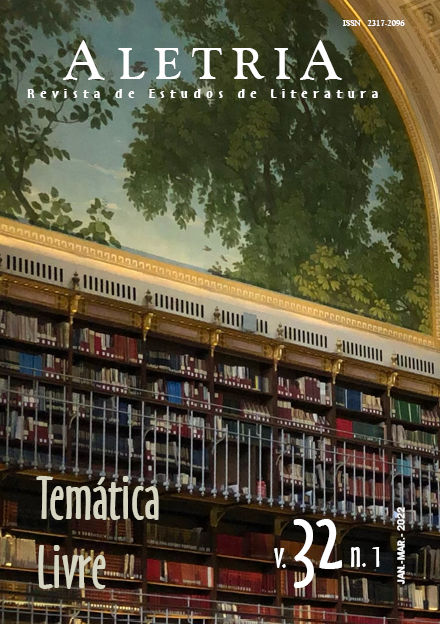Writing as an Impasse
Notes on Vidas Secas
DOI:
https://doi.org/10.35699/2317-2096.2022.35420Keywords:
narrative, other, representation, Graciliano Ramos, Vidas secasAbstract
The study of Vidas secas (Barren lives) enables important reflections on the dilemmas of a literature that aims to bring humanity to people brutalized by the society they live. The work also addresses these dilemmas in the writing, triggering the distance that separates the intellectual from the poor and the difficulty of literarily articulating the voice of the marginalized citizen. In this article, we hypothesize that the novel by Graciliano Ramos works the stalemate between the cultured and illiterate worlds on his narrative instances, form and language, trying to give life and voice to a complex and autonomous other, without neglecting to question literary representation itself.
Downloads
References
BUENO, Luís. Guimarães, Clarice e antes. Teresa, São Paulo, n. 2, p. 249-261, 2001.
BUENO, Luís. Uma história do romance de 30. São Paulo: Edusp; Campinas: Editora da Unicamp, 2006.
CANDIDO, Antonio. A literatura e a formação do homem. Remate de Males, São Paulo, n. esp., p. 81-89, 1999.
CANDIDO, Antonio. Ficção e confissão: ensaios sobre Graciliano Ramos. 3. ed. Rio de Janeiro: Ouro sobre Azul, 2006.
MARX, Karl. O capital: crítica da economia política: livro I: o processo de produção do capital. Tradução de Rubens Enderle. 2. ed. São Paulo: Boitempo, 2017.
RAMOS, Graciliano. Memórias do cárcere. 32. ed. Rio de Janeiro: Record, 1996.
RAMOS, Graciliano. Vidas secas. 137. ed. Rio de Janeiro: Record, 2018.
Downloads
Published
How to Cite
Issue
Section
License
Copyright (c) 2022 Rodrigo Cerqueira (Autor)

This work is licensed under a Creative Commons Attribution 4.0 International License.
Authors who publish with this journal agree to the following terms:Authors retain copyright and grant the journal right of first publication with the work simultaneously licensed under a Creative Commons Attribution Non-Commercial No Derivatives License that allows others to share the work with an acknowledgement of the work's authorship and initial publication in this journal.Authors are able to enter into separate, additional contractual arrangements for the non-exclusive distribution of the journal's published version of the work (e.g., post it to an institutional repository or publish it in a book), with an acknowledgement of its initial publication in this journal.Authors are permitted and encouraged to post their work online (e.g., in institutional repositories or on their website) prior to and during the submission process, as it can lead to productive exchanges, as well as earlier and greater citation of published work (See The Effect of Open Access).





